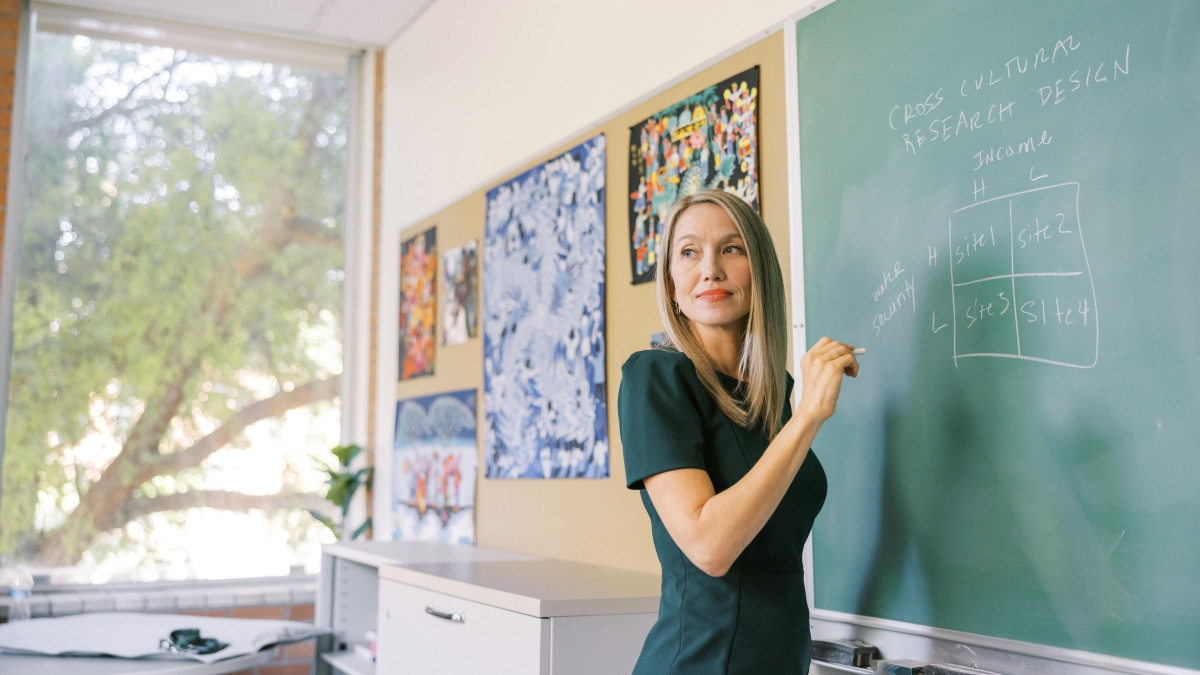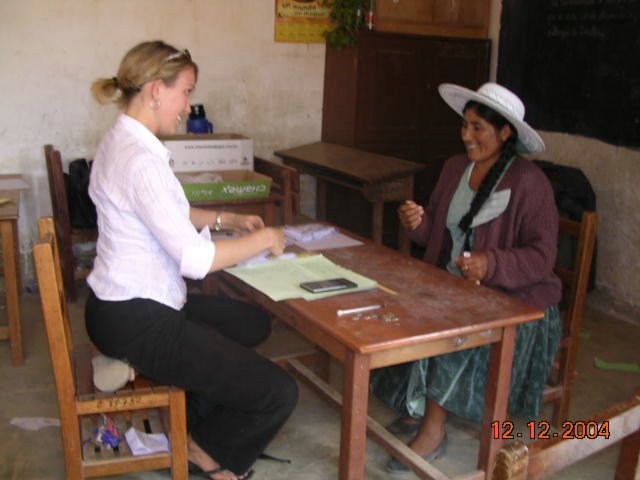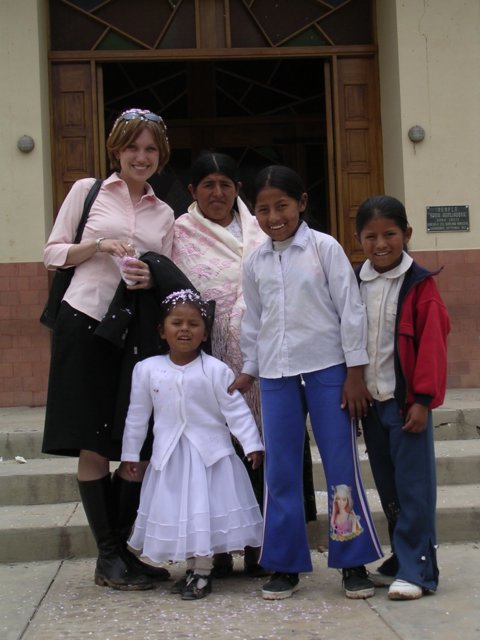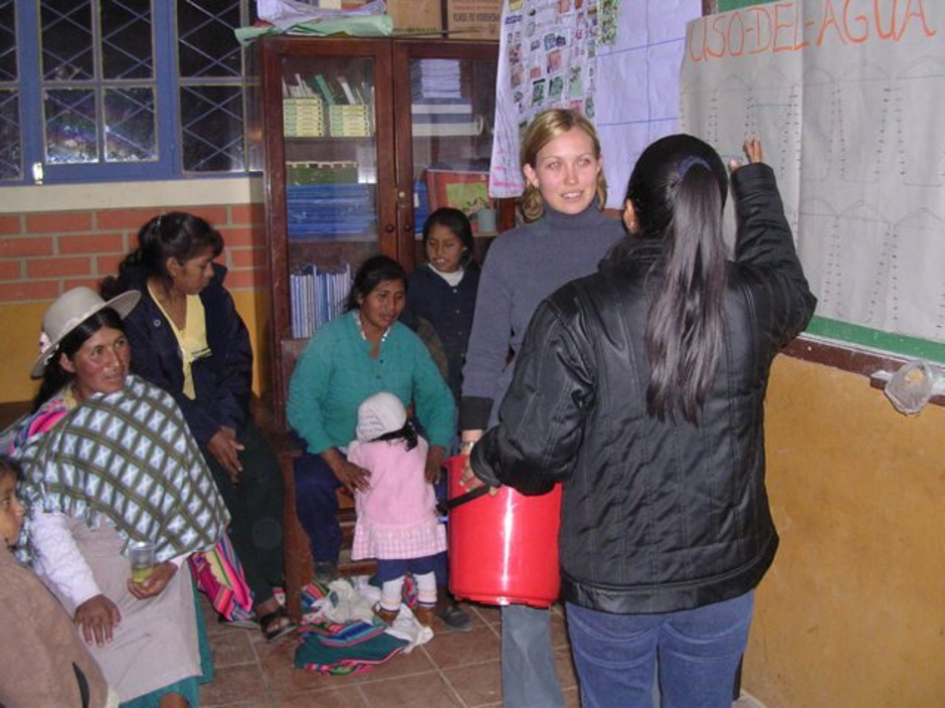ASU water expert Amber Wutich named a 2023 MacArthur Fellow

President’s Professor Amber Wutich was named a 2023 MacArthur Fellow on Oct. 4. Photo courtesy of MacAurthur Foundation
Editor’s note: This story is featured in the 2023 year in review.
At nine in the morning on what she would describe as an “otherwise very normal” day, Amber Wutich sat down at her desk for a day of writing.
When a call came in to her cell phone, she answered right away — she always answers the phone when her children are out of the house. Wutich, a water expert with two decades of research experience under her belt, was informed that she had been selected as a 2023 MacArthur Fellow by the MacArthur Foundation.
The highly coveted fellowship, sometimes referred to as a “genius grant,” is awarded to talented individuals who have shown exceptional originality in and dedication to their creative pursuits. Each fellowship comes with an $800,000 “no strings attached” stipend to be used by the awardee as they see fit. The purpose of the fellowship, according to the MacArthur Foundation, is to enable recipients to exercise their own creative instincts for the benefit of human society.
Wutich is one of only three Arizona State University faculty to receive the award while at ASU, alongside poet Natalie Diaz (2018) and environmental historian Stephen Pyne (1988).
Wutich’s creative instincts have led to major discoveries and groundbreaking work in her field. She, along with the teams she has engaged with, has been awarded $80 million in research funds, published more than 150 peer-reviewed publications and achieved the title of President’s Professor at ASU.
“My work has been relentlessly focused on ensuring that people who are cut off from the predominant ways of distributing water can get enough water to survive,” Wutich said.
Amber Wutich worked with a team of researchers and interviewed locals in Bolivia to establish new ways to measure water insecurity. Photo courtesy Amber Wutich
Wutich also serves on the strategy team for the Arizona Water Innovation Initiative, a state-funded initiative aimed at protecting Arizona’s water security for future generations. She directs the Water for All program within the initiative, which aims to use engineering and social infrastructure to improve water security for vulnerable households and ensure communities that are politically excluded from water access and decision-making can participate in future-focused discussions that impact them most.
“Another goal of the program is to improve water measurement and monitoring so that we know how these kinds of interventions are actually helping people and can pivot if necessary to truly meet their needs,” Wutich said.
"Amber being named a MacArthur Fellow comes as no surprise for her colleagues at the School of Human Evolution and Social Change," said Ryan Williams, director of the School of Human Evolution and Social Change. "Her work as a cultural anthropologist, and the application of that within the landscape of global health, is not only helping to generate invaluable knowledge for communities around the world who face water insecurity, but it is her approach of taking guidance from these communities and collaboration in learning from them that is important and admirable."
Empowering and allowing people to shape their own water futures is crucial, Wutich said, and collaboration is key to creating more sustainable outcomes.
Amber Wutich said the research she was doing in Bolivia was fairly new, as water insecurity hadn’t been greatly explored by researchers at that time. She was able to build relationships with research participants through her work. Photo courtesy Amber Wutich
“Water people are the best people to work with because they are truly dedicated to ensuring that everyone in our society has safe and fair water access,” Wutich said. “But even just within ASU, our water scholars have been working together for 20 years. We have a very tight-knit interdisciplinary group of people that work together from different facets.”
Her own working life is consistent with her values of collaboration. In addition to working with communities around the world, she holds positions within multiple schools at ASU and is affiliated with several programs across the university. She serves as associate director of the Institute for Social Science Research, and directs the Center for Global Health and the Global Ethnohydrology Study within the School of Human Evolution and Social Change, part of The College of Liberal Arts and Sciences. She is also a Distinguished Global Futures Scientist with the Julie Ann Wrigley Global Futures Laboratory.
“Amber has contributed extraordinary knowledge and research on the impact of water insecurity on human well-being,” said Magda Hinojosa, dean of social sciences at The College. “Through careful ethnographic fieldwork in over a dozen countries, she is helping to address some of the most pressing issues facing the globe.”
Wutich’s first exposure to the role of water within our planetary systems was much different from her current work relating to drought conditions. Raised in Miami and exposed to hurricanes, she saw firsthand how water disruptions could shape environments, distress and survival. She officially started working in the water insecurity field in Bolivia just after the Bolivian Water War, a series of protests that took place in Cochabamba in response to the privatization of the city’s municipal water supply company.
Local communities she worked with guided her to study the connections between water insecurity and mental health, and she listened. She has been listening — and working to empower those faced with water inequities — since.
Through her classes at ASU, Wutich shares these experiences with students. She knows they will come into positions of leadership that will steer the efforts of future generations.
“Amber is simply outstanding. Her scholarship on water insecurity in countries across the globe has been pivotal in understanding how water scarcity impacts people and communities today while providing expert guidance on the culturally responsive solutions to the global needs for our collective future,” said Nancy Gonzales, ASU executive vice president and university provost. “She is a remarkable person whose research genius is matched by her strong character and talent for inspiring the ASU students who have the privilege of taking her classes.”
Wutich said one thing she wants people to know about her work is that water insecurity is a problem around the world, but it is not limited to countries outside of the United States. Water inequity can take hold in rural areas without reliable access to water infrastructure, mobile home communities and in households that struggle to pay their water bills.
Amber Wutich said her work studying the relationship between water insecurity and mental health illuminated the key coping strategies that people use to survive in water-scarce conditions, such as informal economy, social networks and cultural norms. Photo courtesy Amber Wutich
Water insecurity can be found anywhere, Wutich said, and must be addressed through investments, new water policy and innovations.
“My work really is dedicated to understanding some of the darkest parts of the human experience,” Wutich said. “More recently, I have started to go back in history and look at how humans have faced moments of extreme climate distress. There is suffering, yes. There is death. But it's also true that humans have historically faced these challenges with enormous innovation and transformations in our society.
"I'm hopeful that if we really do invest in social infrastructure, which is what gives rise to human innovation and ingenuity, that great things could happen for humanity.”
More Science and technology

Applied Materials invests in ASU to advance technology for a brighter future
For nearly 60 years, global giant Applied Materials has been hard at work engineering technology that continues to change how microchips are made.Their products power everything from flat-panel…

Meet ASU engineering students who are improving health care, computing and more
Furthering knowledge of water resource management, increasing the efficiency of manufacturing point-of-care health diagnostic tools and exploring new uses for emerging computer memory are just some…

Turning up the light: Plants, semiconductors and fuel production
What can plants and semiconductors teach us about fuel production?ASU's Gary Moore hopes to find out.With the aim of learning how to create viable alternatives to fossil-based fuels, Moore — an…




